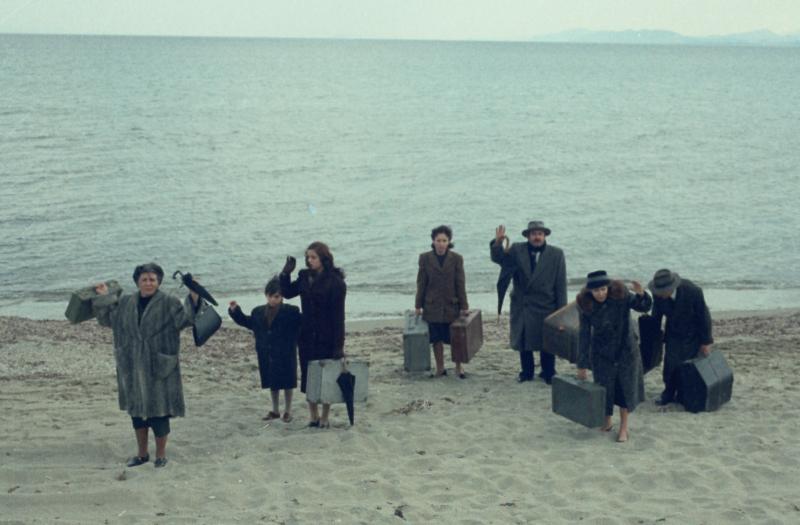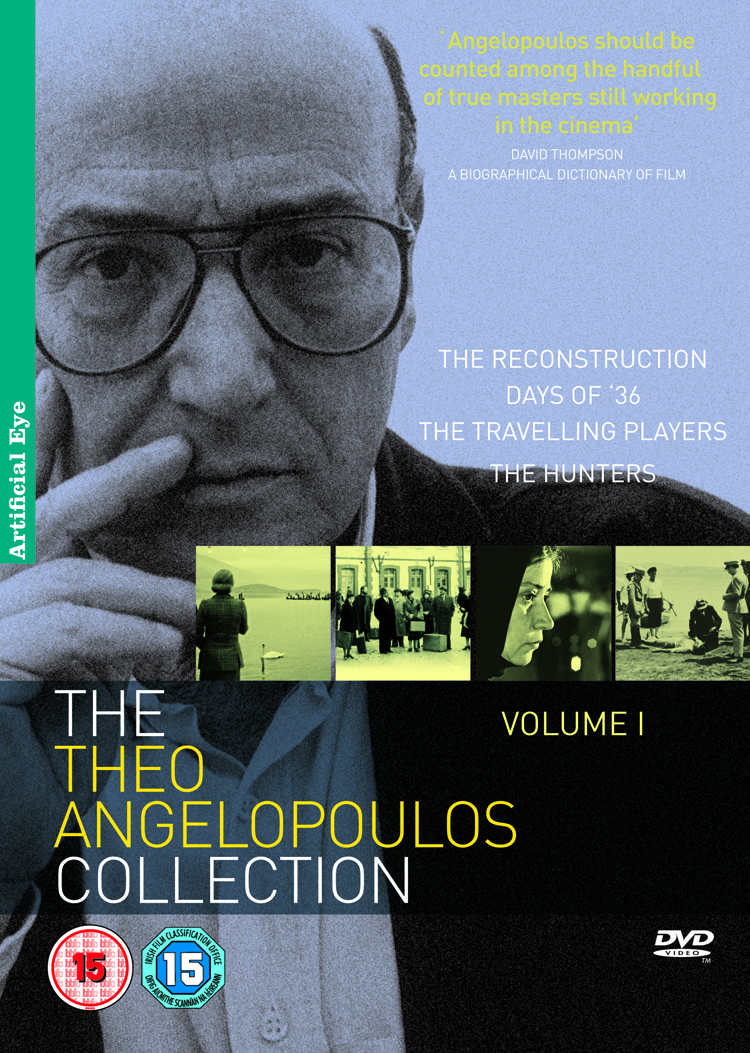DVD: The Theo Angelopoulos Collection Volume 1 | reviews, news & interviews
DVD: The Theo Angelopoulos Collection Volume 1
DVD: The Theo Angelopoulos Collection Volume 1
Four landmark films collected

There’s a scene in Theo Angelopoulos’s The Travelling Players where those gathered in a square hear “the wind of freedom is blowing” being sung. The wartime Nazi occupation is over. Greek, Russian and American flags are aloft. A bomb goes off. In asking whose freedom this was, Angelopoulos had chosen his moment carefully. The film was released in 1975, a year after Greece held its first election since the Colonels took power with American backing in 1967.
Angelopoulos made his first film in 1968, just after the coup d’état had installed the quasi-fascist regime. A new four-DVD box set collects 1970's The Reconstruction, 1972’s Days of ’36, The Travelling Players and 1977’s The Hunters. Greece isn’t far from the news right now, and the crash course Angelopoulos’s films provide in the country’s turbulent recent history is a potent reminder that instability was never far.
 It’s also a reminder that Angelopoulos is a unique director, whose films have an instantly recognisable style. Fast cutting was anathema and the almost four-hour The Travelling Players has 80 shots. His camera follows rather than leads. Without intruding, it observes, capturing what's going on. The closest comparisons are some of the long scenes in Tarkovsky’s The Stalker (which was four years in the future when The Travelling Players was released). There are hardly any close-ups. No one actor leads. Angelopoulos’s films feel more Eastern European than Mediterranean. Partly that’s a result of his style evolving under a repressive, censorious regime, but also because his films look into Greece’s interior, both socially and geographically. Familiar coastlines or island paradises aren't his concern. Although lacking the playfulness, Angelopoulos’s outlook is closer to Miloš Forman’s in The Fireman’s Ball than outside ideas of what Greece ought to be on film.
It’s also a reminder that Angelopoulos is a unique director, whose films have an instantly recognisable style. Fast cutting was anathema and the almost four-hour The Travelling Players has 80 shots. His camera follows rather than leads. Without intruding, it observes, capturing what's going on. The closest comparisons are some of the long scenes in Tarkovsky’s The Stalker (which was four years in the future when The Travelling Players was released). There are hardly any close-ups. No one actor leads. Angelopoulos’s films feel more Eastern European than Mediterranean. Partly that’s a result of his style evolving under a repressive, censorious regime, but also because his films look into Greece’s interior, both socially and geographically. Familiar coastlines or island paradises aren't his concern. Although lacking the playfulness, Angelopoulos’s outlook is closer to Miloš Forman’s in The Fireman’s Ball than outside ideas of what Greece ought to be on film.
Allusion was neccesary to get his early films past the regime – both The Reconstruction and Days of ’36 centre on crimes that are metaphors for what was happening to Greece. The Travelling Players echoes the story of Orestes and the wandering band of actors only have one play, the late-19th-century romantic drama Golfo and the Shepherdess. Each time they try to perform the play, it gets cut short. Each time it’s cut short, they lose one of their number. Just as Greeks were losing their rights. But knowing the allusions, the metaphors and the references isn’t necessary. These languorous yet charged films enthral.
rating
Explore topics
Share this article
The future of Arts Journalism
You can stop theartsdesk.com closing!
We urgently need financing to survive. Our fundraising drive has thus far raised £49,000 but we need to reach £100,000 or we will be forced to close. Please contribute here: https://gofund.me/c3f6033d
And if you can forward this information to anyone who might assist, we’d be grateful.

Subscribe to theartsdesk.com
Thank you for continuing to read our work on theartsdesk.com. For unlimited access to every article in its entirety, including our archive of more than 15,000 pieces, we're asking for £5 per month or £40 per year. We feel it's a very good deal, and hope you do too.
To take a subscription now simply click here.
And if you're looking for that extra gift for a friend or family member, why not treat them to a theartsdesk.com gift subscription?
more Film
 theartsdesk Q&A: director Kelly Reichardt on 'The Mastermind' and reliving the 1970s
The independent filmmaker discusses her intimate heist movie
theartsdesk Q&A: director Kelly Reichardt on 'The Mastermind' and reliving the 1970s
The independent filmmaker discusses her intimate heist movie
 Blu-ray: Wendy and Lucy
Down-and-out in rural Oregon: Kelly Reichardt's third feature packs a huge punch
Blu-ray: Wendy and Lucy
Down-and-out in rural Oregon: Kelly Reichardt's third feature packs a huge punch
 The Mastermind review - another slim but nourishing slice of Americana from Kelly Reichardt
Josh O'Connor is perfect casting as a cocky middle-class American adrift in the 1970s
The Mastermind review - another slim but nourishing slice of Americana from Kelly Reichardt
Josh O'Connor is perfect casting as a cocky middle-class American adrift in the 1970s
 Springsteen: Deliver Me From Nowhere review - the story of the Boss who isn't boss of his own head
A brooding trip on the Bruce Springsteen highway of hard knocks
Springsteen: Deliver Me From Nowhere review - the story of the Boss who isn't boss of his own head
A brooding trip on the Bruce Springsteen highway of hard knocks
 The Perfect Neighbor, Netflix review - Florida found-footage documentary is a harrowing watch
Sundance winner chronicles a death that should have been prevented
The Perfect Neighbor, Netflix review - Florida found-footage documentary is a harrowing watch
Sundance winner chronicles a death that should have been prevented
 Blu-ray: Le Quai des Brumes
Love twinkles in the gloom of Marcel Carné’s fogbound French poetic realist classic
Blu-ray: Le Quai des Brumes
Love twinkles in the gloom of Marcel Carné’s fogbound French poetic realist classic
 Frankenstein review - the Prometheus of the charnel house
Guillermo del Toro is fitfully inspired, but often lost in long-held ambitions
Frankenstein review - the Prometheus of the charnel house
Guillermo del Toro is fitfully inspired, but often lost in long-held ambitions
 London Film Festival 2025 - a Korean masterclass in black comedy and a Camus classic effectively realised
New films from Park Chan-wook, Gianfranco Rosi, François Ozon, Ildikó Enyedi and more
London Film Festival 2025 - a Korean masterclass in black comedy and a Camus classic effectively realised
New films from Park Chan-wook, Gianfranco Rosi, François Ozon, Ildikó Enyedi and more
 After the Hunt review - muddled #MeToo provocation
Julia Roberts excels despite misfiring drama
After the Hunt review - muddled #MeToo provocation
Julia Roberts excels despite misfiring drama
 London Film Festival 2025 - Bradley Cooper channels John Bishop, the Boss goes to Nebraska, and a French pandemic
... not to mention Kristen Stewart's directing debut and a punchy prison drama
London Film Festival 2025 - Bradley Cooper channels John Bishop, the Boss goes to Nebraska, and a French pandemic
... not to mention Kristen Stewart's directing debut and a punchy prison drama
 Ballad of a Small Player review - Colin Farrell's all in as a gambler down on his luck
Conclave director Edward Berger swaps the Vatican for Asia's sin city
Ballad of a Small Player review - Colin Farrell's all in as a gambler down on his luck
Conclave director Edward Berger swaps the Vatican for Asia's sin city
 London Film Festival 2025 - from paranoia in Brazil and Iran, to light relief in New York and Tuscany
'Jay Kelly' disappoints, 'It Was Just an Accident' doesn't
London Film Festival 2025 - from paranoia in Brazil and Iran, to light relief in New York and Tuscany
'Jay Kelly' disappoints, 'It Was Just an Accident' doesn't

Add comment